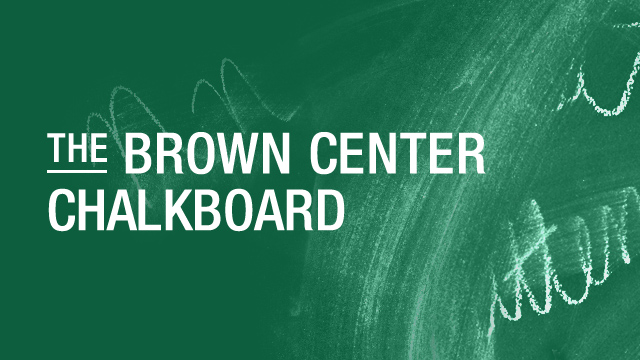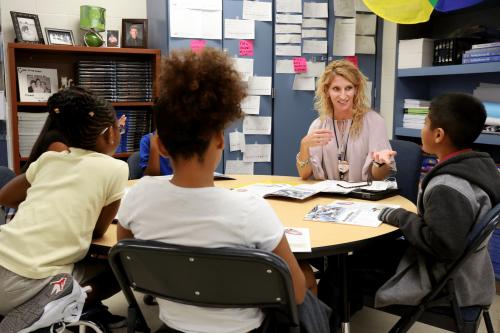Even by kindergarten, students vary in what they know and can do. Some already see multiplication as repeated addition while others are still linking numbers to counts of objects. State standards usually emphasize the latter in kindergarten and hold off on introducing multiplication until grade 3. If a child is ahead in math, she may go unchallenged for roughly two hours a day across 180 school days. Next year, if the child is still above grade level, this pattern repeats—again and again—potentially until she falls back toward grade level.
We tend to think of children who are academically ahead as “fine.” “They will be fine,” is a sentence I have heard spoken many times. And in a relative sense they certainly are. A child that is academically ahead is, by definition, doing better than her peers, at least with respect to academics. Yet, parents know that boredom in school is harmful.
In a recent working paper, I ask whether refraining from challenging a child who is “fine” constitutes a kind of injustice for the child. And if so, what does this mean about the obligations that a public school system has in providing stimulating educational experiences to all students throughout the time they spend in school?
These questions are not esoteric ethical dilemmas. Rather, they sit at the heart of current policy debates. For instance, in New York City, Zohran Mamdani has proposed ending gifted programs because of enrollment disparities. Districts in California and Illinois have eliminated honors classes for similar reasons. The (admirable) goal of these reforms is to reduce inequality that often arises when advanced instruction programs sort students by race and income. I documented that pattern in a Brown Center Chalkboard piece using Office for Civil Rights data.
Yet, the need to ensure equitable opportunities in education doesn’t alleviate the need to address another hard question about our schools: Do flourishing children have an educational claim of their own?
Philosophy has been silent on our obligations to flourishing children—but it shouldn’t be
Educational philosophers have not paid much attention to this issue. Dominant theories focus on equal opportunity or ensuring that all children reach some level that is adequate to meet an important standard, such as literacy, numeracy, or civic participation. These theories say little about what we owe children who are already proficient or not disadvantaged by unequal circumstances.
To the extent that people worry about flourishing children, we tend to think of their interests as instrumental. That is, we think of them only insofar as they might benefit other, less advantaged kids. For instance, we might worry that unless we have differentiated instruction, affluent families will leave public schools—a worry supported by recent evidence—and take their resources with them. Or, we might like that having advanced students in school has positive peer effects that benefit less advanced students. Or, we might argue for investing in high-ability students because they will contribute more in taxes later, which can be used to help the least advantaged. Each of these arguments treats flourishing children solely as tools for redistributive ends.
In my working paper, I aim to develop a principle that doesn’t rely on contingent justifications like these. Because schooling is compulsory, I argue that the state can’t require attendance while offering only a seat in a classroom. Students are owed real chances to grow while they are there. To clarify what that involves, I turn to Scheffler’s account of human potential. Potential is not a static endowment. It unfolds along channels shaped by prior learning and the environment, through a process he calls canalization. Even children who are thriving can falter if those channels dry up. Respecting students means recognizing their capacities as deserving cultivation in their own right. Withdrawing exposure to challenging materials forecloses promising futures.
One might contend that it’s common and acceptable for democracies to ask citizens to make sacrifices that do not benefit them. That is true, but those obligations must be compatible with respect for persons as equals—and they must be reciprocal. They are not supposed to fall on one group, year after year. Asking flourishing children to accept boredom across many grades is not a shared civic duty. It is a selective and durable burden placed on a subset of students. Moreover, we shouldn’t use core aspects of a child’s identity or intellectual development as tools for redistribution. Talents, interests, and emerging intellectual identities are not public property.
What policy can do
These debates are shaped by zero-sum thinking. We worry that if teachers devote more time and resources to enrichment for flourishing students, those with greater needs will get less. Those concerns are real. But the point of this essay is that the development of flourishing children is not exchangeable in the way some may think taxable income is. Their boredom is not an appropriate redistributive tool.
That leaves a real policy challenge: how to balance the needs of flourishing students without taking too much of our scarce resources away from students who need more support.
Current debates about advanced coursework in middle and high school have drawn most of the political attention, but these fights represent only a small slice of the real problem. The larger challenge lies in elementary school classrooms, where day after day children who are already fluent readers or numerically advanced sit through material they mastered much earlier. Political energy around AP and honors courses has obscured the more common injustice of daily under-stimulation for younger children.
So, how might we bridge concerns for equality with the recognition that all children are due enrichment?
State-level funding formulas hint at the right principle. Nearly all state formulas begin with a base allocation for every student and then add weights for poverty, disability, English learner status, and other needs. This reflects a simple idea. Education is owed to all children, but some children have greater needs.
State standards and accountability generally fail in this regard. As an alternative, states could prioritize growth over proficiency metrics. Not only are growth metrics more equitable because they do not penalize students for their level of achievement upon entering school, they also encourage schools and teachers to promote learning for all students, even those who are thriving academically. Standard-setting can follow suit. Instead of making end-of-year content goals, states can publish continuous learning progressions. Then, teachers can index these progressions to a student’s current level and identify the next learning steps in the sequence. The Northwest Evaluation Association’s (NWEA) learning continuum framework, used in more than 35,000 schools, does just this. In this way, standards are not anchored to end-of-year performance but inherently continuous, and accountability encourages student progression through the sequence regardless of starting point.
There are school-level models that also point in a better direction. For example, Ellis Elementary in Rockford has grouped readers by ability across grades. That kind of cross-grade grouping acknowledges uneven readiness and allows children to engage with work matching their abilities. Math can follow a similar path with flexible placement and open entry and reentry points so children can move into more demanding material whenever they are ready.
A better way forward
Scarcity is real, but childhood boredom is not the price of equality. When we understand continued challenge as something public schools owe every child, advanced learning stops being seen as an inequity to eliminate and becomes a duty to uphold.
Guaranteeing continuous challenge for all children can help navigate complex policy debates around access to advanced materials. That reframes fights over AP and gifted programs and redirects attention to the hours younger students spend under-stimulated. States can publish continuous progressions and shift accountability toward growth. Districts can use flexible placement and daily acceleration blocks. New technology can help in mixed classrooms, but only if policy keeps it a public tool that serves both students who need catching up and students who are ready to move ahead.
The Brookings Institution is committed to quality, independence, and impact.
We are supported by a diverse array of funders. In line with our values and policies, each Brookings publication represents the sole views of its author(s).








Commentary
High-achieving students deserve to be challenged in school
November 4, 2025